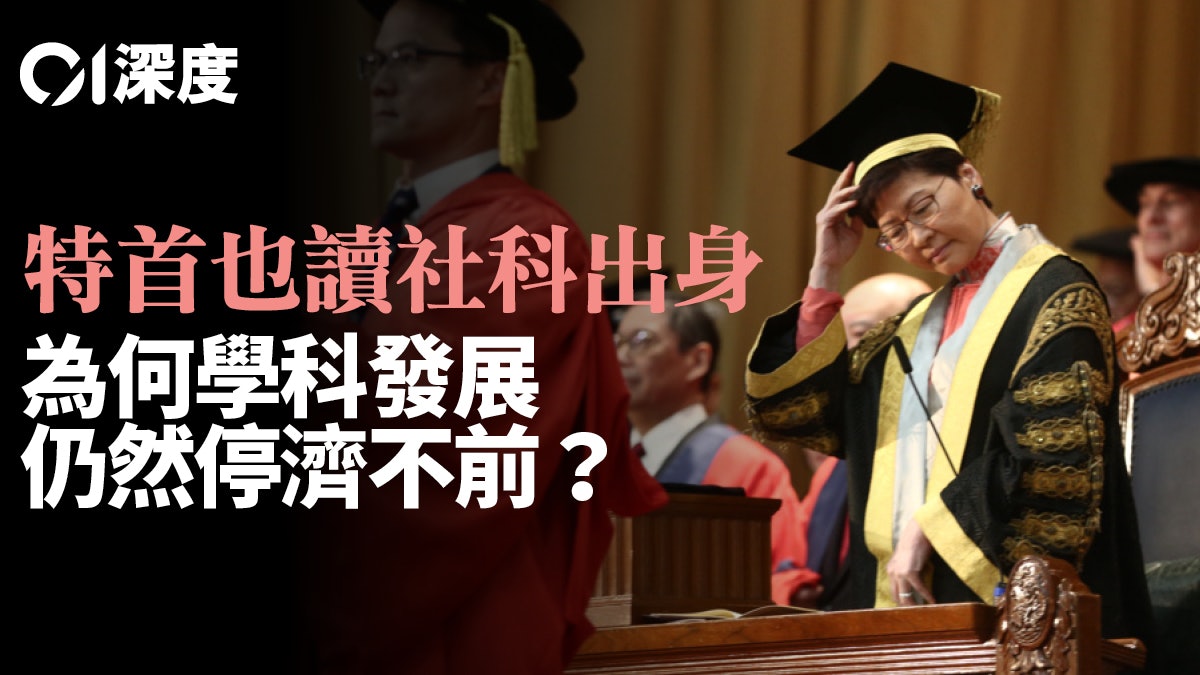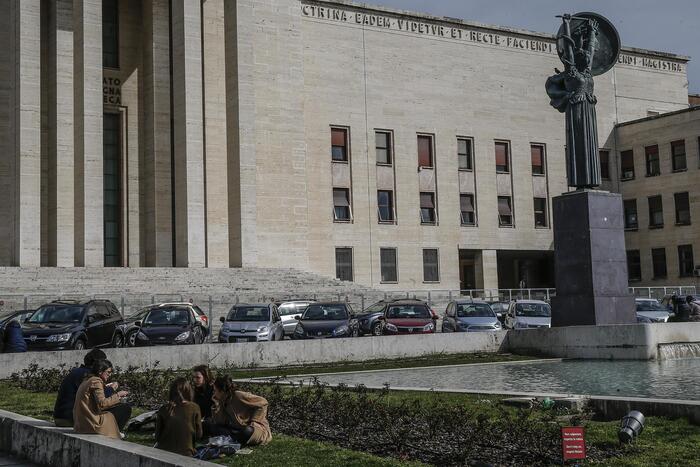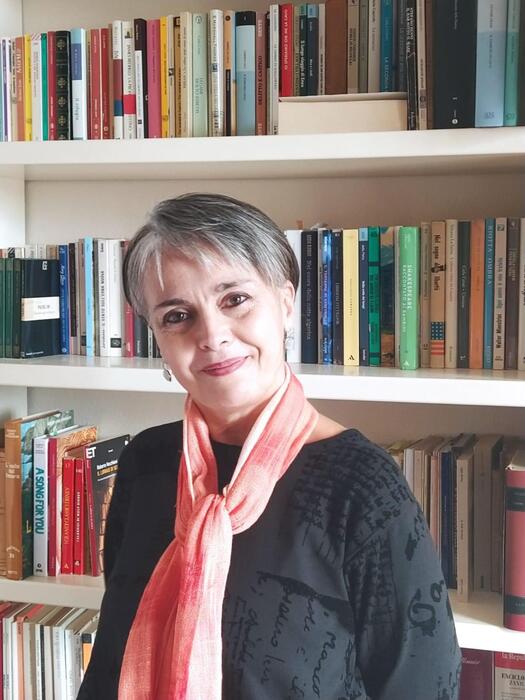Hong Kong is facing very serious deep-seated structural contradictions and is at a very critical period of social transformation.
However, there has been a lack of consensus in society on how to promote social transformation and how to resolve deep-seated structural contradictions. One of the crux of the problems stems from the fact that the development of social sciences in Hong Kong is far from being sufficient to respond to social problems.
"Social science" is an important tool for understanding and transforming society, but the direction of Hong Kong's development is not clear, so there are more or less misunderstandings in society. To promote the development of social science to answer the proposition of the times.
In addition, Hong Kong has long been dominated by a business-oriented culture in educational value. In recent years, it has been catching up with the innovation and technology boom. The proportion of social science resources and students is relatively small, and social science-related jobs are becoming more and more difficult to find a way out. Social science graduates. It is inevitable to worry about the future.
Is it really useless to study social sciences?
How should the SAR government revive social sciences?
"Social science" is an important tool for understanding and transforming society, and it is also a key force for historical development and social progress.
(Getty Images)
The definition of social science in the eight universities is different
Social sciences, together with natural sciences, technical sciences, and humanities, are called the four major scientific fields.
Broadly speaking, the social sciences are the counterparts of the natural sciences, including the humanities, which are all interdisciplinary sciences that take human behavior and social phenomena as their research objects, and are used to explain various phenomena and their laws of development.
As for the disciplines covered by the social sciences, different countries and regions have different practices. The definitions and classifications of Hong Kong are also dazzling. Even the eight major public institutions funded by the government basically do not have a unified description, and their existence meanings and missions are different. different.
The School of Social Sciences of the University of Hong Kong is the most traditional, with the Department of Geography, the Department of Psychology, the Department of Social Work and Social Administration, and the Journalism and Media Research Center of the Department of Sociology. The course "emphasizes social innovation and global citizenship"; The Academy of Sciences, in addition to the necessary subjects of traditional social sciences, also incorporates architecture and economics, "aimed at cultivating young people to become high-quality professionals with global aspirations"; City University combines humanities and social sciences to open "Humanities and Social Sciences" The Academy of Sciences”, in addition to sociology, psychology, international studies, communication studies, and public administration, also includes departments of Chinese and history, translation and language, etc., “cultivating cultural soft power”; Polytechnic University combines medical care and social sciences In addition to the Department of Applied Sociology, the other four departments are all related to nursing. Its website states that it is "mission-based on professional-based academic excellence" and "actively responds to the needs of the industry".
In an exclusive interview with "Hong Kong 01", Zhao Zhiyu, Dean of the School of Social Sciences of the Chinese University of Hong Kong, summed up his understanding of "social science" with "the human heart" - "the human heart" includes culture and institutions, and "human heart" refers to behavior, emotion, etc.
He explained that social sciences are fundamentally concerned with the mutual influence of "world" and "human heart", but different disciplines have their own emphasis.
It can be said that social science is a comprehensive manifestation of a place's thinking ability, spiritual character, civilization quality, and competitive strength. It is also an important tool and key force for human beings to understand and transform society.
In Hong Kong, which has just gone through great political changes, how to improve people's lives, achieve fairness and justice, and maintain social stability, all of which need to be explored and answered by social sciences.
However, does the SAR government understand the existence and development orientation of social sciences in this way?
Zhao Zhiyu believes that a good social science education must allow students to have more room for development.
(Photo by O Jiale)
Fewer resources, fewer students, and less research
Putting social sciences into the framework of "education" to see its effectiveness, as one of the four major fields of science, the number of students majoring in social sciences in universities is quite limited.
"Hong Kong 01" according to the UGC's 2020/21 enrollment data of the eight universities, a total of 1,836 students enrolled in social sciences, accounting for 10% of the total number of students enrolled in the eight universities.
There are few students, and the resources invested by the colleges are also less.
"Hong Kong is a pity. We (advocate) the so-called 'Central Value', especially the government. When they approve us to open certain disciplines, they will look at the short-term labor market, but I think this is relatively short-sighted." President of Hang Seng University He Shunwen felt helpless for the government's contempt for social science education, which led to the skewed allocation of resources.
Because Hong Kong is deeply immersed in the distortions of capitalism and the monopoly of "Central Values", it only considers short-term economic interests, and does not know how to re-formulate industrial planning in response to the needs of social development, so as to create more good jobs for students majoring in social sciences.
Putting the social sciences into the framework of "research" and examining its development, the achievements are not obvious.
Although the international rankings of the major social science colleges in Hong Kong are indeed good, if you ask these colleges what research they have actually released that is of great significance to solving the Hong Kong problem, I am afraid that most people will not be impressed.
Taking the Chinese academic journal "Hong Kong Journal of Social Sciences" as an example, "Hong Kong 01" has sorted out 598 themes of papers published in the "Journal" from its inception in 1993 to 2017, and found that only 96 of them are related to Hong Kong, accounting for only 16. %; and in the journals after 2014, there are not even any research articles directly analyzing the 79-day large-scale occupation in 2014 and the 2019 anti-amendment turmoil.
Zhou Yongxin, an emeritus professor of the Department of Social Work and Social Administration of the University of Hong Kong, explained to Hong Kong 01 that the reason for the decline of local social science research is that the University Grants Committee (UGC), which dominates educational resources, has since 1993 announced to all government-funded colleges Conduct the Research Assessment Exercise (RAE), and the performance of the assessment is crucial to the institution's access to government research funding.
In order to cater to the tastes of RAE reviewers, scholars had to write articles with a more "international perspective". For example, Zhou Yongxin also added Chinese elements when he wrote articles on local elderly issues.
In addition, Zhou Yongxin said that in addition to RAE, the UGC will also provide "General Research Fund" (GRF) to individual outstanding scholars. If scholars want to obtain GRF, their research must be published in international journals, and GRF's To some extent, it will affect the promotion of scholars in colleges and universities. "That's how the 'game' is played, and there is no future for doing local research."
In addition, Xie Yongling, a former associate professor of the Department of Social and Behavioral Sciences at CityU, also pointed out that the citations of papers are relatively heavy in the international ranking formula, and the university will require professors to write more high-quality and high-ranked papers, so most professors will "emphasize research rather than teaching".
"Hong Kong 01" compiled the topics of 598 papers published in the "Hong Kong Journal of Social Sciences" from 1993 to 2017, and found that only 96 of them were directly related to Hong Kong.
(Screenshot of the journal website)
Emphasis on business, science, and innovation
One of the stereotypes of the general public about social science graduates is that they focus on theoretical training, lack practical skills, and are relatively useless.
In April last year, the official website of the People's Bank of China published an article "Understanding and Countermeasures for my country's Population Transformation", which mentioned that "one of the reasons why Southeast Asian countries fall into the middle-income trap is that there are too many liberal arts students." It even published the "futility theory of liberal arts" including social sciences.
Hong Kong did not participate in it, but the SAR government's talent cultivation policy and educational resource allocation are enough to show the authorities' attitude towards the "uselessness of liberal arts".
The employment rate and starting salary of social science graduates have been at a disadvantage for a long time, and they have not received special support from the government. They are regarded as "begging for food".
According to the UGC 2019/20 data, the employment rate of social science graduates from the eight universities ranges from 19% to 86%. As for other social science courses, the employment rate is generally between 50% and 70%, which is relatively low compared to other professional disciplines.
In addition, the 2017/18 academic year graduate salary statistics updated by the UGC in January 2020 show that the average annual salary of medical, dental and nursing students is the highest, reaching 462,000 yuan, but social science graduates are only 227,000 yuan. .
Zhou Qiping, a senior human resources consultant and managing director of Yizhi Consulting, said in an inquiry from Hong Kong 01 that the market has had a strong demand for IT talents a few years ago, and the outbreak of the new crown virus has increased the innovation and technology of citizens and enterprises. application, so it is easy to get a job by studying these subjects.
But Zhou Qiping also emphasized that the subjects of social science cover a wide range of knowledge, such as psychology, criminology, public administration, etc., and some even cover many practical skills, such as communication, social work, sociology, etc. , I believe that the future of social science students is no less than that of other disciplines.
From the perspective of economic interests, it is not unreasonable for the government and universities to urge such talent training.
However, there are always people who choose subjects for their interests. Jessica (pseudonym), a fourth-year student of the School of Social Sciences at the Chinese University of Social Sciences, is one of them. She has been very concerned about social and current affairs since middle school, and she has long been determined to study social sciences. Contribute to society.
However, from Jessica's experience, Hong Kong's job market is not as diverse as Zhou Qiping said, and employers are not optimistic about social science students.
In the final months of her college career, Jessica is worrying about her future career path.
The political situation in Hong Kong has undergone drastic changes after the turmoil of post-2019 amendments, and the future of related industries is unclear.
Previously, Jessica's family wanted her to join the government as a civil servant, and she wanted to become a political publicist, but both options failed due to the changing political environment, so she had to change her job goals and seek some business public relations or marketing. Work.
However, Jessica said that it is difficult to get hired without relevant knowledge. She can only try to show her soft skills during the interview, hoping that employers will see her potential.
She believes that many students studying in the Department of Social Sciences have similar troubles and fail to choose a future career based on their own interests.
Zhou Qiping, a senior human resources consultant and managing director of Yizhi Consulting, believes that the prospects of students studying social sciences are not inferior to other disciplines.
(Photo by Lin Ruoqin)
Does social science training work?
In contrast, foreign countries have already begun to reflect on the phenomenon of "Qingwen".
For example, in the book "Counterattack of the Humanities" by American business journalist George Anders, it is mentioned that the software engineers and data analysts hired by the online store platform Etsy have diverse backgrounds, such as college majors in literary history, Japanese Studies, etc.
However, the Hong Kong government and the job market are falling into a myth - overly worshipping talents with "specialized skills" and tending to understand the development of things from a one-sided technical level, while ignoring the "connotations" such as cause and effect or the law of development.
The SAR government naturally has the responsibility to lead the society to break this myth, but Jessica does not have much confidence in the authorities and society, so she hopes that the university can provide more assistance, such as increasing the number of internships, helping students acquire more practical skills and devote themselves to different fields. industry.
"If you ask what the prospects are after studying social sciences, in fact, as the world trend changes, we all expect a good social science education to allow students to have more room for development." Zhao Zhiyu understands social science education in this way meaning and value.
According to his observations over the years, some social science majors are easier for students to connect to a clear path, but there are also some subjects that do not have a specific path, and students inevitably worry: is it useful to read?
However, the concepts of "useful" or "useless" are subjective to anyone.
Some people think that studying social sciences is "useless" for individuals or society, especially in this "innovation-first" society, it is more difficult for them to contribute their talents.
Of course, there are always people who believe that studying social sciences is "useful", but most of them put their personal preferences above the reality of employment, purely based on social science values that fit them, and hope to help society.
Different people's subjective judgments of "useful" and "useless" can be explained by German sociologist Max.
Max Weber's "rationalization" explained, he divided it into "instrumental rationality" and "value rationality", and Hong Kong's talent cultivation policy is based on "instrumental rationality" - always taking the result as the consideration of behavior, Utilitarian motives drive behavior, so studying social sciences is considered "useless".
For the government, it is "useful" to develop and master I&T, because all parts of the world are catching up with I&T trends.
Since 2015, the government has planned a "one-stop" training for I&T talents, and put forward suggestions and strategies for promoting STEM education in primary and secondary schools, so as to cultivate I&T talents to meet the needs of the economy in today's world.
But from another perspective, the government seems to have turned Hong Kong's education into an "arsenal". Students have been educated on the premise of "vocational orientation" since primary school, and will become one of the development tools required by the government in the future.
He Shunwen is puzzled by this policy, worried that the government's STEM policy has become "homework" - simply because the society wants to implement STEM, but without thinking about the development strategy.
He Shunwen, who studied social sciences, has no prejudice against any subject, so he encourages students to choose undergraduate courses according to their own interests, not just their future.
Adhering to the educational philosophy of "future should not override interest", he devoted himself to promoting liberal arts professional education and vigorously promoting the development of humanities and social sciences after he became the president of Evergrande.
He is convinced that social science training can bring certain benefits to students. For example, social science students usually have better thinking, communication skills, and judgment skills, and promotion to the middle and high-level does not "undermine the bottom." Students who study STEM, business administration, law, engineering and other disciplines will be employed later, usually two to three years later, and the salary scale is lower than that of studying practical disciplines. At their peak, around the age of 55, it doesn’t matter to study any subject, and even a background in the humanities or social sciences is found to be paid more than other subjects.”
After Ho Shunwen became the President of Hang Seng University, he devoted himself to promoting liberal arts education in the school with both liberal arts and sciences.
(Photo by O Jiale)
Social science education should also be transformed
Another stereotype about the social sciences is that they focus too much on theoretical learning and despise practice.
Zhao Zhiyu admitted that the teaching model of social sciences may need to be changed. The traditional social science education model attaches great importance to theory, because people believe that theory can explain phenomena, but due to the limitation of research methods, ignoring theory may not be able to solve practical problems, separating theory from practice. Come.
However, after the 1990s, scholars tend to study what theories can solve social problems. A theory that can solve problems smoothly is a successful social science theory, that is, "solution oriented social science".
This change has also brought about a transformation in the way of social science education. Zhao Zhiyu, for example, in the college, the current part of reading articles will be changed to require students to do it at home, and students will be required to practice theory in class.
However, he also admitted that the teaching mode is still in transition, and many professors are still "obsessed" with the traditional teaching mode, but with the participation of more young teaching staff, he believes that the atmosphere will gradually change.
In addition, in order to increase the competitiveness of social science graduates, Zhao Zhiyu designed some comprehensive courses for students to choose according to the talent demand in the market.
He pointed out that some good social science degrees will try to arrange for students to communicate or give them the opportunity to do internships.
Zhao Zhiyu reiterated: "Nowadays, it is no longer a learning model of reading a stack of papers in class, taking an exam, and graduating with enough credits, because most social science courses can give you this kind of experience. The problem is how can we Let students have some experience in four years and turn it into knowledge that students can use to contribute to society in the future. Social science is used to improve society and answer social problems.”
In the mainland who believe in Marxism, Marx's philosophy is regarded as the guiding ideology of the social sciences and humanities, collectively referred to as "philosophy and social sciences".
President Xi Jinping attaches great importance to the development of social sciences. He presided over a symposium as early as 2016, talking about the "more important status and more arduous tasks" of contemporary Chinese philosophy and social sciences - in the face of turbulent social thoughts, profound changes in the international environment, economic The rapid changes in development, the constant emergence of contradictions in reform, and the integration and confrontation of world cultures all require social sciences to play a greater role.
He also pointed out the shortcomings of the current social science development, including the unclear strategy, the overall low level of discipline system, academic system, and discourse system construction, weak academic originality, imperfect training system, and unscientific evaluation system.
For the development of social sciences in Hong Kong, it seems to face the same challenges and dilemmas.







